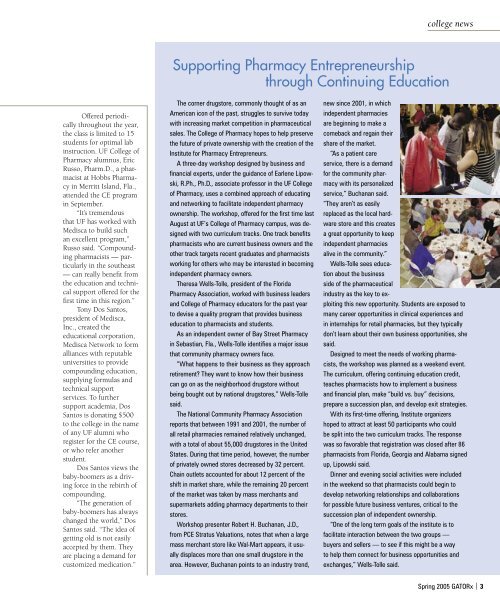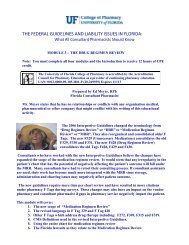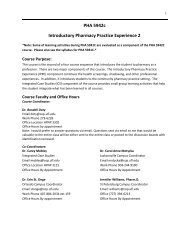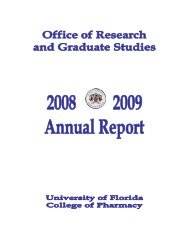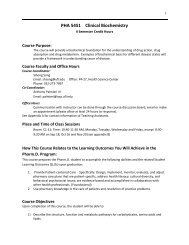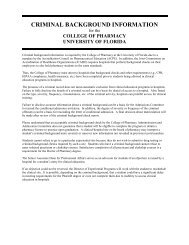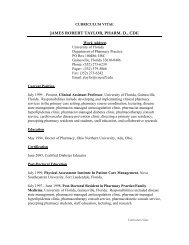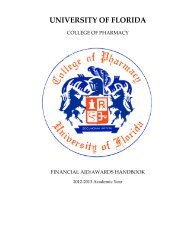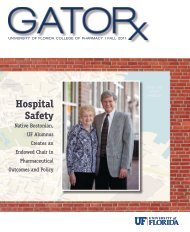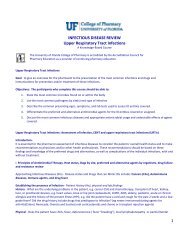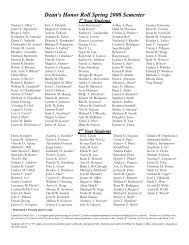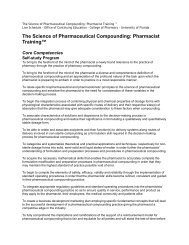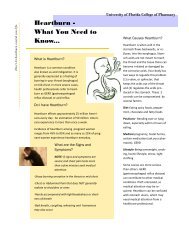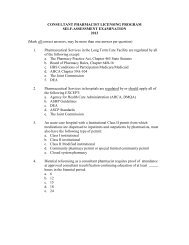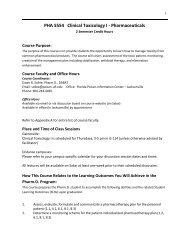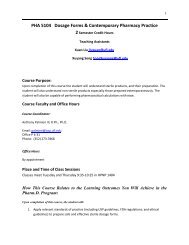GATORx W05.indd - College of Pharmacy - University of Florida
GATORx W05.indd - College of Pharmacy - University of Florida
GATORx W05.indd - College of Pharmacy - University of Florida
Create successful ePaper yourself
Turn your PDF publications into a flip-book with our unique Google optimized e-Paper software.
Offered periodically<br />
throughout the year,<br />
the class is limited to 15<br />
students for optimal lab<br />
instruction. UF <strong>College</strong> <strong>of</strong><br />
<strong>Pharmacy</strong> alumnus, Eric<br />
Russo, Pharm.D., a pharmacist<br />
at Hobbs <strong>Pharmacy</strong><br />
in Merritt Island, Fla.,<br />
attended the CE program<br />
in September.<br />
“It’s tremendous<br />
that UF has worked with<br />
Medisca to build such<br />
an excellent program,”<br />
Russo said. “Compounding<br />
pharmacists — particularly<br />
in the southeast<br />
— can really benefit from<br />
the education and technical<br />
support <strong>of</strong>fered for the<br />
first time in this region.”<br />
Tony Dos Santos,<br />
president <strong>of</strong> Medisca,<br />
Inc., created the<br />
educational corporation,<br />
Medisca Network to form<br />
alliances with reputable<br />
universities to provide<br />
compounding education,<br />
supplying formulas and<br />
technical support<br />
services. To further<br />
support academia, Dos<br />
Santos is donating $500<br />
to the college in the name<br />
<strong>of</strong> any UF alumni who<br />
register for the CE course,<br />
or who refer another<br />
student.<br />
Dos Santos views the<br />
baby-boomers as a driving<br />
force in the rebirth <strong>of</strong><br />
compounding.<br />
“The generation <strong>of</strong><br />
baby-boomers has always<br />
changed the world,” Dos<br />
Santos said. “The idea <strong>of</strong><br />
getting old is not easily<br />
accepted by them. They<br />
are placing a demand for<br />
customized medication.”<br />
The corner drugstore, commonly thought <strong>of</strong> as an<br />
American icon <strong>of</strong> the past, struggles to survive today<br />
with increasing market competition in pharmaceutical<br />
sales. The <strong>College</strong> <strong>of</strong> <strong>Pharmacy</strong> hopes to help preserve<br />
the future <strong>of</strong> private ownership with the creation <strong>of</strong> the<br />
Institute for <strong>Pharmacy</strong> Entrepreneurs.<br />
A three-day workshop designed by business and<br />
financial experts, under the guidance <strong>of</strong> Earlene Lipowski,<br />
R.Ph., Ph.D., associate pr<strong>of</strong>essor in the UF <strong>College</strong><br />
<strong>of</strong> <strong>Pharmacy</strong>, uses a combined approach <strong>of</strong> educating<br />
and networking to facilitate independent pharmacy<br />
ownership. The workshop, <strong>of</strong>fered for the first time last<br />
August at UF’s <strong>College</strong> <strong>of</strong> <strong>Pharmacy</strong> campus, was designed<br />
with two curriculum tracks. One track benefits<br />
pharmacists who are current business owners and the<br />
other track targets recent graduates and pharmacists<br />
working for others who may be interested in becoming<br />
independent pharmacy owners.<br />
Theresa Wells-Tolle, president <strong>of</strong> the <strong>Florida</strong><br />
<strong>Pharmacy</strong> Association, worked with business leaders<br />
and <strong>College</strong> <strong>of</strong> <strong>Pharmacy</strong> educators for the past year<br />
to devise a quality program that provides business<br />
education to pharmacists and students.<br />
As an independent owner <strong>of</strong> Bay Street <strong>Pharmacy</strong><br />
in Sebastian, Fla., Wells-Tolle identifies a major issue<br />
that community pharmacy owners face.<br />
“What happens to their business as they approach<br />
retirement? They want to know how their business<br />
can go on as the neighborhood drugstore without<br />
being bought out by national drugstores,” Wells-Tolle<br />
said.<br />
The National Community <strong>Pharmacy</strong> Association<br />
reports that between 1991 and 2001, the number <strong>of</strong><br />
all retail pharmacies remained relatively unchanged,<br />
with a total <strong>of</strong> about 55,000 drugstores in the United<br />
States. During that time period, however, the number<br />
<strong>of</strong> privately owned stores decreased by 32 percent.<br />
Chain outlets accounted for about 12 percent <strong>of</strong> the<br />
shift in market share, while the remaining 20 percent<br />
<strong>of</strong> the market was taken by mass merchants and<br />
supermarkets adding pharmacy departments to their<br />
stores.<br />
Workshop presenter Robert H. Buchanan, J.D.,<br />
from PCE Stratus Valuations, notes that when a large<br />
mass merchant store like Wal-Mart appears, it usually<br />
displaces more than one small drugstore in the<br />
area. However, Buchanan points to an industry trend,<br />
college news<br />
Supporting <strong>Pharmacy</strong> Entrepreneurship<br />
through Continuing Education<br />
new since 2001, in which<br />
independent pharmacies<br />
are beginning to make a<br />
comeback and regain their<br />
share <strong>of</strong> the market.<br />
“As a patient care<br />
service, there is a demand<br />
for the community pharmacy<br />
with its personalized<br />
service,” Buchanan said.<br />
“They aren’t as easily<br />
replaced as the local hardware<br />
store and this creates<br />
a great opportunity to keep<br />
independent pharmacies<br />
alive in the community.”<br />
Wells-Tolle sees education<br />
about the business<br />
side <strong>of</strong> the pharmaceutical<br />
industry as the key to exploiting<br />
this new opportunity. Students are exposed to<br />
many career opportunities in clinical experiences and<br />
in internships for retail pharmacies, but they typically<br />
don’t learn about their own business opportunities, she<br />
said.<br />
Designed to meet the needs <strong>of</strong> working pharmacists,<br />
the workshop was planned as a weekend event.<br />
The curriculum, <strong>of</strong>fering continuing education credit,<br />
teaches pharmacists how to implement a business<br />
and financial plan, make “build vs. buy” decisions,<br />
prepare a succession plan, and develop exit strategies.<br />
With its first-time <strong>of</strong>fering, Institute organizers<br />
hoped to attract at least 50 participants who could<br />
be split into the two curriculum tracks. The response<br />
was so favorable that registration was closed after 86<br />
pharmacists from <strong>Florida</strong>, Georgia and Alabama signed<br />
up, Lipowski said.<br />
Dinner and evening social activities were included<br />
in the weekend so that pharmacists could begin to<br />
develop networking relationships and collaborations<br />
for possible future business ventures, critical to the<br />
succession plan <strong>of</strong> independent ownership.<br />
“One <strong>of</strong> the long term goals <strong>of</strong> the institute is to<br />
facilitate interaction between the two groups —<br />
buyers and sellers — to see if this might be a way<br />
to help them connect for business opportunities and<br />
exchanges,” Wells-Tolle said.<br />
Spring 2005 <strong>GATORx</strong> | 3


